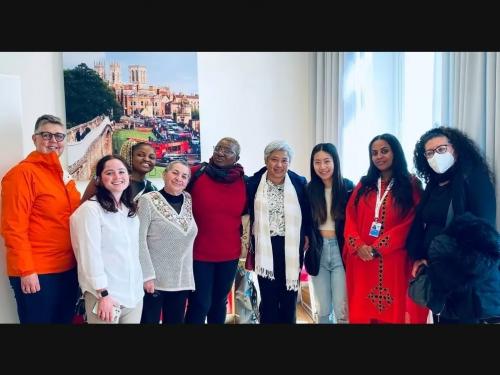Ecofeminists participate in roundtable discussions at Stockholm+50 associated event

Almost 30 ecofeminists gathered at an event associated with the Stockholm+50 conference titled “Feminist priorities for people, planet and peace” on June 1, 2022 at the Stockholm Environmental Institute and virtually. (FOWPAL)
By Nicole Chen
The “Stockholm+50 Conference, under the theme of “A healthy planet for the prosperity of all – our responsibility, our opportunity,” will take place on June 2-3, 2022. The conference, co-hosted by Sweden and Kenya, is convened by the United Nations at Stockholmsmässan in Stockholm, Sweden. In addition to plenary sessions and side events, there are about 160 associated events.
Almost 30 ecofeminists gathered at an event associated with the Stockholm+50 conference titled “Feminist priorities for people, planet and peace” on June 1, 2022 at the Stockholm Environmental Institute and virtually.
The event brought together ecofeminists from various countries to talk about their work and policy recommendations on the intersection of gender equality and environmental policies. The event was hosted by the Women’s Major Group along with the support of Women Engage for a Common Future (WECF).
Speakers include Freezer Yeheyis (PHE), Carmen Capriles (Reaccion Climatica), Cecile Ndjebet (REFACOF), Dr. Priscilla Achakpa (WEP), Lili Fuhr (CIEL), Caroline Usikpedo (NDWMPD) and Gro Lindstad (FOKUS), among others. The event was moderated by Sascha Gabizon (WECF International).
Freezer Yeheyis, who started the discussion for the day, explored the issues of culture around female reproductive services in her home country Ethiopia. She explained that women in Ethiopia often believe that having as many children as possible is an optimal outcome without realizing the consequences of raising so many children. Her organization PHE aims to educate women and show them the financial consequences of starting a big family.
“To address one issue, there should be different sectors engaged: we bring the health sector and the environment sector together…. we show the community how this integration works,” she said. “We do this through economic empowerment of women. We engage women in decision making so that they can have enough knowledge and access to education so that they can empower their children…. to take over the environment and better manage the natural resources.”
Other speakers discussed the effect of gold mining on native women, the consequences of a toxic environment on economic development, and policies surrounding inclusive sanitation and water security.
- 410 reads
Human Rights
Fostering a More Humane World: The 28th Eurasian Economic Summi

Conscience, Hope, and Action: Keys to Global Peace and Sustainability

Ringing FOWPAL’s Peace Bell for the World:Nobel Peace Prize Laureates’ Visions and Actions

Protecting the World’s Cultural Diversity for a Sustainable Future

Puppet Show I International Friendship Day 2020

